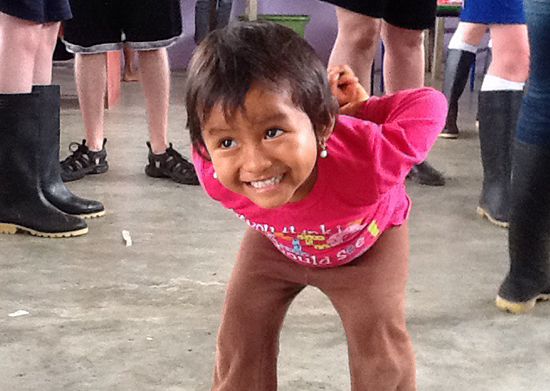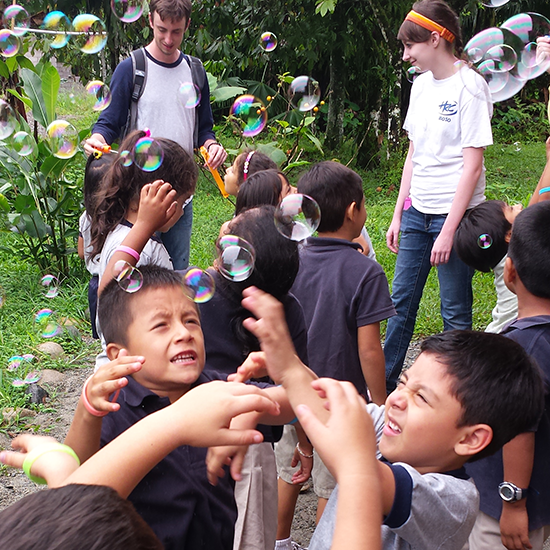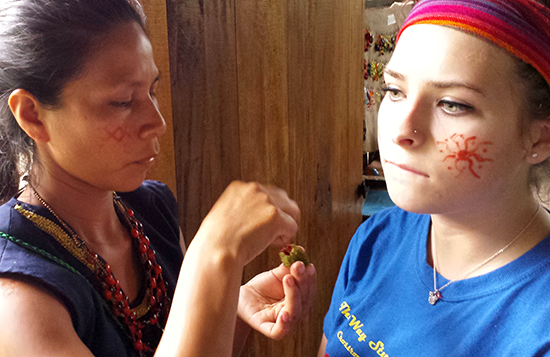
April-May 2021
Bloom
------------------
|





CHE in Ecuador
By Adam Duncan
Jesus identified five aspects of discipleship in Luke 10:27-28: “Thou shalt love the Lord thy God with all thy heart, and with all thy soul, and with all thy strength, and with all thy mind; and thy neighbor as thyself. And he [Jesus] said unto him, Thou has answered right: this do, and thou shalt live” (emphasis mine).
These five aspects of our being reflect the Creator in us: heart—emotions and motivations; soul—spiritual and eternal; strength—physical; mind—intellect and education; and neighbor—relational. Sin attacks each of these areas and prevents us from being in true fellowship with God and one another. This foundational attack on who we are as eternal beings created in the image of God is the root of poverty, suffering, violence, and famine. When we seek to alleviate human suffering, we must recognize the root cause, not only the effect.
Often, we focus on consequences to individuals or the community as a whole, but they are the fruit, not the root, of the problem. If we picture a cultural or community problem as a tree, we can identify four components to effect lasting change. Fruit grows on the branches of behavior. If we focus only on changing behavior or mitigating the consequences, we achieve temporary change. Those behavioral branches sprout from the trunk of values. Values grow from the roots of belief. Ultimately, the roots have to change for lasting impact. Let’s use alcoholism in Ecuador as an example.
The eastern jungle of Ecuador has the highest rate of alcoholism in the region. Visible consequences include malnutrition, chronic dehydration, broken families, sexual abuse, poverty, liver failure, and other physical symptoms. If addressed solely through education, it’s like trying to plug holes in a boat while bouncing along a rocky shoal. Each time one hole is sealed, another leak appears. With a slightly longer view, we see alcohol use as a primary source of nutrition and hydration as deeper causes.

These include lack of access to clean water (physical need), failure to understand the effects of alcoholism (educational need), social pressures and cultural norms (relational need), and hopelessness and a sense of futility (spiritual need). Each of these reflect a worldview bereft of God’s love, a true sense of community, and an understanding of eternity. How do we mitigate the consequences, while modifying the behavior and grafting the whole tree into roots of eternal significance? That is our task in Ecuador. Remember the alcoholism tree; we will come back to it.
Recently, I attended Community Health Evangelism (CHE) training. More than a set curriculum, CHE is an approach to relief work and evangelism built on the foundation of Luke 10:27-28. Recognizing relief work without community growth is not sustainable, CHE seeks to provide long-term solutions based on local community ownership and initiative.
Rather than an expert telling a community how it must utilize limited resources to solve a problem, CHE involves the local community in identifying needs and resources in its own unique situation and guides the discussion toward lasting solutions. This wholistic, community-based approach means effective solutions do not rely on outside materials, financial support, or expertise. CHE attempts to achieve a balance between immediate relief (outside materials, finances, and expertise required) and community development (sustainable change achieved without outside resources).

Let’s revisit the alcoholism tree. An immediate relief action might provide a portable water-filtration system and multivitamins to address nutritional deficits. This works in the short term, but without access to these items on a long-term basis, lasting change cannot be achieved. When analyzed from a CHE perspective, we identify several roots and customize solutions to address them.
Emotional: Parents naturally love their children. I may not choose to care for my own health but providing for my children is a great motivator. Discussions regarding the effects of alcoholism and nutrition on children can serve as a powerful motivator. This often falls into the category of felt needs.
Social: Rather than each family having its own well, spring, or rainwater filtration system, communities that share this resource feel a sense of duty to their neighbors to maintain and sustain it. Appealing to civic pride can motivate initial change while building new community values sustains that change.
Educational: Teaching about a balanced diet, proper hydration, the effects of alcohol on the body, and how to sterilize water empowers community members to make personal and group decisions, which in turn, helps the entire community.
Physical: Utilizing local resources, for example sand filtration and ultraviolet sterilization techniques, allows local experts to build new systems and maintain existing systems long after the missionary leaves.
Spiritual: Having addressed clean water issues, the door is open to talk about the Living Water. Having identified alcohol as a poison harming the body, the door is open to talk about sin as a poison harming the soul. Placing this conversation in a spiritual context is necessary for effective disciple making. Just as we train a local expert on clean water and another on health needs, we train a local expert on spiritual matters who then disciples the community.
A team is the best mechanism to implement this plan. Fortunately, we have four vital ministry partners in Ecuador. The first is Antioch Christian Academy and its parent organization Jungle Kids for Christ. These ministries have worked to meet the educational needs of children and families for over 13 years.
The second is the Antioch Missionary Alliance. Since 2015, the Missionary Alliance has planted churches and trained pastors to meet the spiritual needs of communities currently without an ongoing Christian presence.
A third partner is the local health department. Entering a community requires an introduction. One good way to make that introduction is through providing health care. By organizing portable medical clinics in remote villages, we build relationships that can be broadened to meet more than just medical needs.
Our fourth partner is you! Reaching a new community takes time, effort, and resources. Often relationships start with an event. When a short-term group from The Hanna Project, College Missions Program, or ETEAM (see photos above) arrives, the participants bring energy, skills, and enthusiasm to kick-start long-term relationships. We encourage you to consider staffing and supporting a short-term team. We would love to show you what God is doing in Ecuador. Even better, some Ecuadoran, Jesus-believing disciples would love to share what God has done in their communities, and we would love to introduce you to them.
About the Writer: Adam and Carol Duncan were approved as missionary interns to Ecuador in December 2019. Adam is an ordained minister, licensed counselor, and former police officer and trainer. Carol is an R.N. in the Family Nurse Practitioner program at Frontier Nursing University. They have two teenage children: Caleb and Moriah. For more information about CHE visit www.chenetwork.org. Learn more about the Duncans at iminc.org.
|
|

